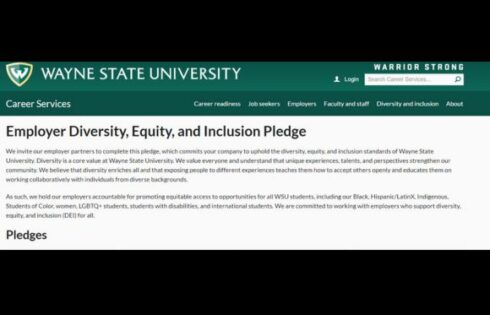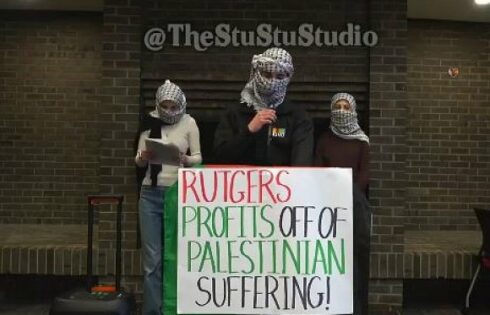
Wenyuan Wu | Minding the Campus
The fringe lens of critical pedagogy has swallowed today’s academia. Facts are deconstructed, logical reasoning is contorted, historical narratives are rewritten, and causality takes a back seat to the post-modernist project of affirming feelings and identities. Increasingly, words lose meaning and become weaponized for the sake of ideological conformity.
Cue the perennial abuse of “white supremacy.” The phrase’s original meaning of a belief system that White people are inherently superior to other races is now completely coopted with shapeshifting and ever-expanding connotations. Objectivity, a sense of urgency, perfectionism, and written words are characteristics of white supremacy culture. Getting married, like structural racism, bolsters white supremacy. Even soap dispensers perpetuate white supremacy.
The U.S. academia has now concocted an absurd proposition that speaking and writing proper English is a form of white supremacy. The term is “Linguistic White Supremacy (LWS)” or “White Language Supremacy (WLS),” depending on where you look.
According to the Conference on College Composition and Communication (CCCC), a membership-based professional association for “diverse communicators inside and outside of postsecondary classrooms,”:
WLS assists white supremacy by using language to control reality and resources by defining and evaluating people, places, things, reading, writing, rhetoric, pedagogies, and processes in multiple ways that damage our students and our democracy. It imposes a worldview that is simultaneously pro-white, cisgender, male, heteronormative, patriarchal, ableist, racist, and capitalist … WLS is, thus, structural and usually a part of the standard operating procedures of classrooms, disciplines, and professions…WLS perpetuates many forms of systemic and structural violence.
CCC goes on to outline the characteristics of WLS as “habits of white language,” including: “individualism,” “stance of neutrality, objectivity, and apoliticality,” “rational, controlled self,” “rule-governed, contractual relationships,” “clarity, order, and control.” In other words, good virtues and values, with roots in the Age of the Enlightenment, are just learned habits of white supremacists.
For the Metropolitan State University of Denver, “Linguistic White Supremacy,” which is equated with standard American English, permeates every facet of higher education, such as writing, grading, teaching, and campus life. There is no “correct” or “standard” way to write and speak in American English. The standard version is “a social construct that privileges white communities and maintains social and racial hierarchies.” To combat linguistic white supremacy, educators must grade with equity, keeping “grammar and mechanics to less than 10% of the overall grade.”
Similarly, professors should also adopt restorative approaches to plagiarism, allowing students to rewrite the essay, removing penalties for late assignments, and even abstaining from using an originality checker at all. According to opponents of linguistic white supremacy, plagiarism is an excusable plea for help and a courageous act of defiance. After all, students may be unable to speak or write standard American English because they don’t understand the citation system, come from a country “that believes that copying other people’s work is an homage to that person,” or lack the confidence. The woke bigotry of low expectations is on full display here.
To put it in plain English, teachers should cut students, especially those who are not White and therefore underprivileged, some slacks if they plagiarize or make grammatical errors in writing. Giving penalties is simply inequitable and racist.
A pair of faculty members from the University of Southern California School of Education coins the term “linguistic racism” as “the mistreatment, devaluation, and acts of discrimination towards people based on their language use or perceptions about their ethnicities.” The researchers proceed to advise immigrants to make a conscious effort to keep their accents and honor their own grammar structures in defiance of the mistreatment from native speakers of English.
Approximately 43 million U.S. adults possess low literacy skills and two-thirds of whom are U.S.-born, 35 percent are white and Hispanic. This new crusade against standard English is only going to make things worse. We all know what will happen when parents and other authority figures fail to provide structure and enforce discipline for children. The antiracist business of fighting linguistic white supremacy infantilizes young college students and feeds them a fat big lie by trivializing the importance of mastering reading, writing, and speaking English.
I don’t know who needs to hear this: As a first-generation immigrant whose native language can’t be more different than English, I pride myself on steadily improving my spoken and written language skills. It makes life for myself and those I interact with more pleasant and less confusing. More importantly, it is infinitely more empowering than trying to fit the world around me into the surmountable limitations of a language barrier.
The irony is not lost when subscribers to the antiracism dogma can’t live up to their own expectations. Recently, my colleague—also a Chinese immigrant—mispronounced the Spanish last name “Jimenez” at a local school board meeting when he publicly commented on academic transparency and accountability. Instead of showing tolerance towards this linguistic mistake, the school board’s most progressive trustee immediately mocked my colleague.
When it comes to battling systemic linguistic white supremacy, the warriors only want “rules for thee, not for me.”
Originally published on June 12, 2024 by Minding the Campus.
MORE: ‘Romance,’ is white supremacy, black studies professor says
IMAGE: Creativa Images/Shutterstock
Like The College Fix on Facebook / Follow us on Twitter




Add to the Discussion